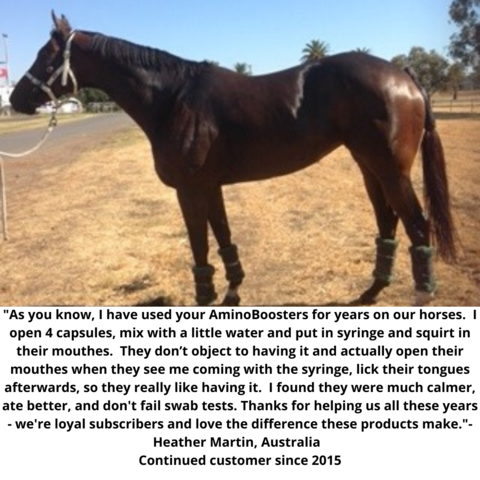Why Horses and Humans Suffer Gut Issues
Modern methods of horse keeping and feeding are believed to be why so many performance horses suffer from gut ulceration.
It is natural for a horse to graze almost continuously, for more than half of every 24 hour period. The horse, whose mechanism survival is flight, does not need to carry a large amount of food in its stomach, because that would impede its speed.
So equines have quite a small stomach designed to take continuous but small amounts of feed.
Hydrochloric acid is always present in the stomach, which, if devoid of recently chewed food, is a cause of gut ulcers.
Dr John Kohnke (2008) states
“Up to 90% of horses in training, irrespective of breed or stage of training, have visual evidence of erosion and ulcerated surfaces on the non-glandular stomach lining.”
The digestive tract in most areas is lined with mucous membranes and is only one cell thick and has a vast area for absorption due to its folded structure.
No substances are absorbed through the stomach lining, as this begins in the small intestine. Therefore the stomach lining must be a tight and healthy barrier. Mucous is produced by the gastric glands in the stomach lining, providing a gelatinous protective coating.
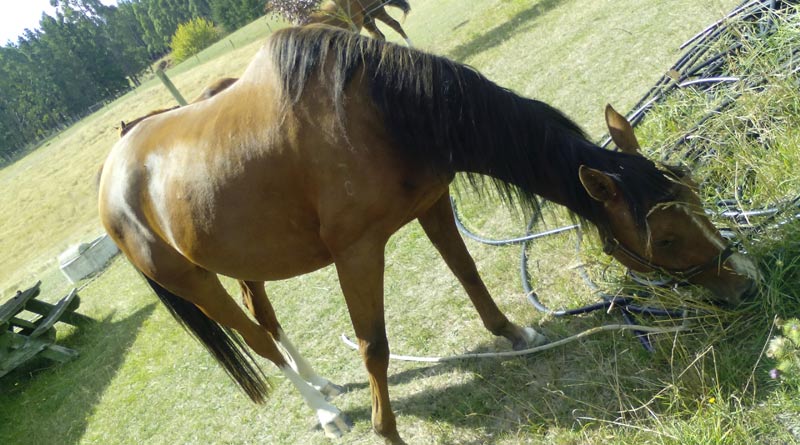
Although the horse by its dentition is classified as a grazing animal, its genetic influence – passed down from the days when it was a tapir-like creature which browsed on leaves, shoots, herbs, berries, woody stems, flowers and twigs – means they still enjoy browsing on wide array of food items.
Many “high performance” horses are restricted from grazing for most of their working life, with only very short spells, which is why gut ulceration has reached epidemic proportions.
Even horses who are regularly spelled, or rested, such as racehorses, often do not have access to grazing during their time off.
Demands of competition and travel also stress horses and trigger gut ulceration.
Emotions profoundly influence both the function and structure of gastro-intestinal tissue.
Prevent ulcers by feeding plenty of roughage to horses
When it is difficult to provide good grazing, the next best thing is to feed plenty of hay. Free access to hay should always be provided if there is nil or very poor grazing.
It is a matter of getting a balance right between the rough whites and rich greens for the individual horse, when it comes to feeding roughage – that is, hay and chaff.
A horse needs at least 1% of bodyweight in roughage (pasture and/or hay) to maintain bodyweight. If in poor condition, it needs at least 2%.
So a horse weighing 450kg with a condition score of 4 still needs 4.5kg per day.
You need to know what your horses weigh and what your feeds weigh, too. If the horse is lucky enough to have access to good grazing, you need to calculate the forage contribution from grazing when working out roughage feeding amounts.
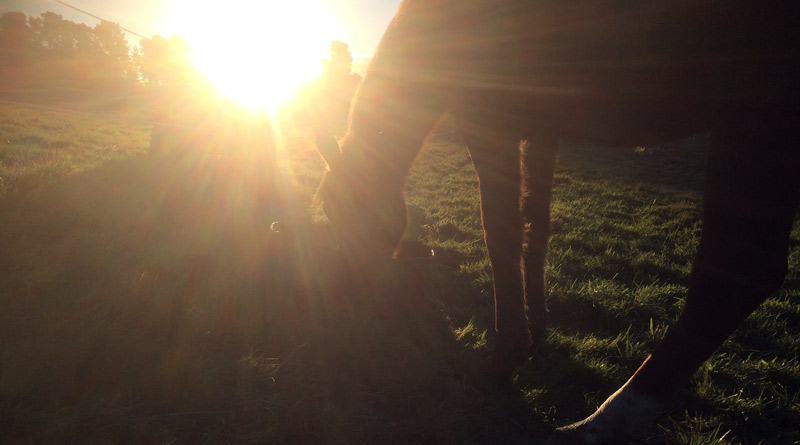
The veterinary perspective
Despite vets having made it clear for many years that diets must be based on a high proportion of hay and chaff to prevent gut ulceration, their advice is often ignored.
Pre-mixed feeds and pellets, which are quick and easy to feed, are popular, and this is the next big problem when it comes to gut ulcers. The vast majority of manufacturers of these feeds recommend feeding a proportionately higher percentage of chaffs and hays with their feeds, but this advice is often not followed. When adequate roughage is fed in conjunction with these feeds, many problems can be averted.
To make matters worse it is also common practice to continually dose horses with gut ulcer products, which use the human model as the basis. Using a product which stops hydrochloric acid production in the stomach, for example, interferes with the normal process of digestion. Other products are alkalising, or provide pH buffers or provide a lot of mucilage to coat the mucous membranes of the gut lining. While all this sounds like a good idea, all of them interfere with the normal process of digestion, so the absorption of nutrients are severely disrupted, and they don’t actually heal ulcers.
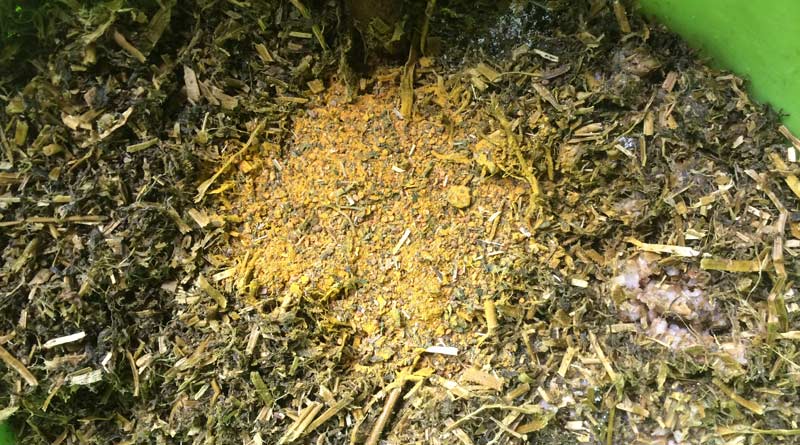
How to heal gut ulcers in horses
Victoria Ferguson, Dip.Herb.Med., is a practicing equine herbalist who has been treating ulcers successfully in all types of horses for more than 20 years. Much of the herbal information in this article has been provided by Victoria, for which we give thanks for her knowledge and experience.
We are also grateful to HERDZ, a leading Australian supplier for horse and the rider, for providing some of the information in this article.
Victoria Ferguson says that it is essential for horses to be fed a natural diet during treatment and for maintenance in the future.
If the horse is treated and then put back on a low-roughage, high-percentage processed feed diet, the ulcers will return. Herbs can be given concurrently but this diet won’t work nearly as well as the combination of natural diet and therapeutic herbal treatment using medicinal liquid extracts. These are necessary for treating horses with ulcers as they are syringed orally and start to be absorbed in the mouth, then go straight to the liver via the portal vein circulation, so they don’t go through the gastro-intestinal tract, where absorption is compromised with gut ulceration.
Not all horses with ulcers exhibit the same symptoms, so the symptoms help in deciding which solution to prescribe.
Marshmallow
Marshmallow is a nutritious, healing and demulcent herb which is particularly applicable to horses with loose manure.
Liquorice
If the horse has very hard or dry manure you can use Liquorice extract instead.
Peppermint, Fennel, Fenugreek
Horses with ulcers inevitably have a poor appetite so even when you give them natural feed, they need a helping hand in the form of appetite stimulants such as Peppermint, or Fennel and Fenugreek.
Dandelion, St Mary's Thistle, Agrimony
The liver also needs detoxification and there are many liver herbs to choose from. Dandelion root being the most gentle and applicable for many horses. St Mary's Thistle is called for where a horse has been subjected to a continuing regime of performance enhancing drugs, such as steroids. Agrimony is very good if the horse is prone to scouring.
Chamomile, Mugwort
Nervine herbs are also part of treatment, as these horses show a lot of unhappy, nervous behaviour due to the fact that they are in pain. Chamomile and Mugwort are two of the best for gut reactors.
Meadowsweet
For pain relief Meadowsweet heads the list, and is a specific herb for treatment of gut ulceration.
Aloe Vera
Other herbs to help heal gut ulcers are micro-flora balancers, such as Aloe Vera. One can use an extract of the gel of the inner leaf grown organically as part of a prescription.
As can be seen, it is not a simple a matter of adding a few dried herbs in the feed; the herbs must be chosen carefully for the individual horse concerned, dosage is important and the horse must be monitored during the course of treatment so that any necessary changes can be made.
Owners and trainers must realise that ulcers return very quickly if prevention is not maintained with correct feeding.
AminoBoosters™ Young Tissue Extract Supplements
A number of horse owners use AminoBoosters Young Tissue Extract supplements for their horses, with remarkable results.
From racehorses to Spanish stallions, performance horses to favourite ponies, the AminoBoosters Young Tissue Extract supplement has been used by owners for the last five years.
The advantages of these cortisol-balancing natural ingredients include being suitable for all types of horses and ailments. Reducing high levels of cortisol, the stress hormone, enables the horse's own immune system to get to work instead of being suppressed.
Stress ulcers can respond very well to the balancing of cortisol levels, along with demonstrating increased calm, responsiveness, focus, and performance.
The muscle-conditioning and stem cell generative abilities of AminoBoosters are added bonuses.
UK Vet Uses And Recommends AminoBoosters
Roger Meacock BVSc MRCVS, is a qualified UK Veterinary Surgeon, with an International Referral and Second Opinion practice.
Roger recommends AminoBoosters for use with horses, dogs, cats and other livestock.
As well as caring for international competition horses, Roger also treats dogs including Crufts champions and qualifiers.
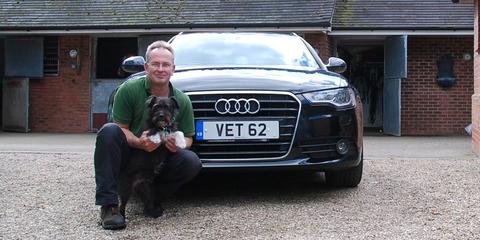
The majority of Roger's veterinary work is with horses, although his practice treats many dogs as well as other animals.
Roger also treats people in his capacity as a Complementary and Alternative Practitioner.
Roger and his clients have had considerable health successes, in many cases where "proven" approaches have failed.
Roger says,
"There are a number of genuine reasons why some of the techniques and products I use have not been subjected to the sort of trials often mistaken as evidence for being effective and "proven". Similarly, many "proven" commonly used techniques and products do not have this level of proof either! In many cases the "science" behind these "proven" techniques and products is poor, unrepeatable and unreliable..."
This view is reinforced by Dr Richard Horton, editor of The Lancet, who wrote in The Lancet and as Guest Editor for the Medical Journal of Australia (MJA 2000; 172:148-149)
"The mistake, of course, is to have thought that peer review was any more than a crude means of discovering the acceptability — not the validity — of a new finding. Editors and scientists alike insist on the pivotal importance of peer review.
We portray peer review to the public as a quasi-sacred process that helps to make science our most objective truth teller. But we know that the system of peer review is biased, unjust, unaccountable, incomplete, easily fixed, often insulting, usually ignorant, occasionally foolish, and frequently wrong."
Roger is constantly on the look-out for new techniques, products and ideas to improve my treatment capabilities and services that I offer and to fill any gaps.
If you have a specific veterinary health issue you are seeking help for, you can contact Roger with individual requests to discuss your situation for a fair and honest appraisal.
Many cases that were previously written off with no hope (either at all or unless without drastic surgery or risky medication) have made an excellent recovery using Roger's holistic approach and mostly non-invasive techniques.
The majority of Roger's work is within the UK although he has clients in Italy, Norway, France, Guernsey, and beyond. If there is enough work, Roger will travel wherever required. Within the UK Roger has clients in Kent, Cornwall, Scotland and between.
Have confidence in using AminoBoosters for your horses, dogs, cats and other livestock knowing it is recommended by a qualified and internationally respected Veterinarian, and by horse owners from the UK to Australia.
